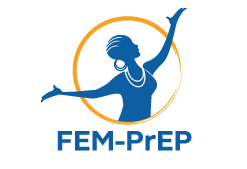What was FEM-PrEP?
FEM-PrEP was a Phase III randomized, placebo-controlled clinical trial designed to assess the safety and effectiveness of a daily oral dose of 300 mg of tenofovir disoproxil fumarate (TDF) and 200 mg of emtricitabine (FTC) for HIV prevention among women. FTC/TDF prevents HIV from reproducing in HIV-infected people. The purpose of the FEM-PrEP trial was to test whether FTC/TDF could also be used safely and effectively to prevent HIV infection—an approach known as pre-exposure prophylaxis (PrEP).
A total of 2,120 HIV-negative women who were between the ages of 18 and 35 and were at higher risk of HIV exposure volunteered to take part in FEM-PrEP. FEM-PrEP was conducted at four sites in three countries:
- Impact Research and Development Organization (Bondo, Kenya)
- Setshaba Research Centre (Pretoria, South Africa)
- Josha Research (Bloemfontein, South Africa)
- Kilimanjaro Christian Medical Center (Arusha, Tanzania)
Potential participants first went through a screening process and, if found eligible and if consent was provided, were enrolled in the trial within four weeks of the screening. Enrolled participants were asked to take the study pill (either TDF/FTC or placebo) for approximately 12 months and to attend monthly clinic visits for approximately 14 months. Participants who became HIV-positive during the trial stopped taking the study pill, were referred for care and treatment, and were asked to stay in the trial and to continue to come to clinic visits for another 12 months.During the trial, participants received free physical exams, counseling and testing for HIV and other sexually transmitted infections, treatment for curable sexually transmitted infections, a regular supply of male and female condoms (where available) and contraception. Social-behavioral research was embedded within the clinical trial protocol to explore participants’ trial experiences as the trial was being implemented, allowing staff to respond to any emerging concerns and to gather data related to the secondary objectives on adherence and sexual behavior.
Following a scheduled interim review of the FEM-PrEP study data in April 2011, the trial’s Independent Data Monitoring Committee advised that the FEM-PrEP trial would be highly unlikely to be able to demonstrate the effectiveness of FTC/TDF in preventing HIV infection in its study population, even if it continued to its originally planned conclusion. FHI concurred and initiated an orderly closure of the trial over the subsequent months.
Primary results of FEM-PrEP emphasized the role of adherence in HIV prevention studies and the need to determine better approaches for supporting adherence in future PrEP programs. Despite targeted counseling and support, adherence to the drug regimen was low and, as a consequence, FEM-PrEP was unable to demonstrate effectiveness of FTC/TDF.
Three other studies were associated with the FEM-PrEP clinic trial. Formative research was conducted at three FEM-PrEP study sites prior to the start of the clinical trial to inform community members about the proposed FEM-PrEP clinical trial and ensure that the trial would meet community needs and to gather data to inform study procedures. A second study was conducted to facilitate local discussions about the introduction of PrEP, using the Bondo, Kenya and Pretoria, South Africa trial site communities as case studies. A third study was conducted after the conclusion the trial to explore the reasons participants adhered and did not adhere to the daily investigational regimen, and to explore their future potential use of ARV-based HIV-prevention methods that may become available.
FHI 360 is proud to have worked with so many excellent partners—including local communities, universities, and expert researchers in Africa—to undertake this important research. Advances in our understanding of ways to prevent HIV can only come from this kind of close collaboration among scientists, communities and the individuals who participate in clinical trials.
FEM-PrEP was conducted with two grants funded by the U.S. Agency for International Development (USAID): the Contraceptive and Reproductive Health Technologies and Research Utilization Program (GPO-A-00-05-00022-00) and the Preventive Technologies (GHO‑A‑00‑09‑00016-00). Early support was also provided by the Bill & Melinda Gates Foundation(No. 19789.01). Gilead Sciences, Inc. donated FTC/TDF and placebo.
